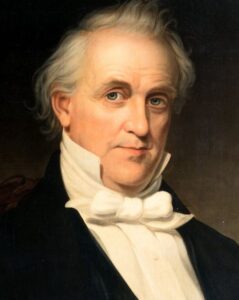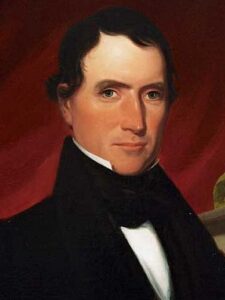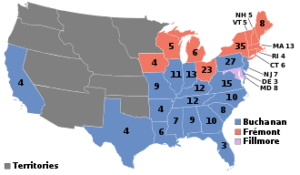» posted on Saturday, June 29th, 2024 by Linda Lou Burton
#15. Buchanan, James Jr
 Linda Lou Burton posting from Little Rock, Arkansas – James Buchanan Jr (April 23, 1791 – June 1, 1868) was the 15th president of the United States, from 1857 to 1861. We’ve gone from rough and ready to dull to pretty boy in descriptions of the last few presidents. The words obscure and forgettable also popped up. James Buchanan is the first one that has been accused of treason by a biographer. Jean Baker wrote in 2004: “Buchanan’s failing during the crisis over the Union was not inactivity, but rather his partiality for the South, a favoritism that bordered on disloyalty in an officer pledged to defend all the United States.…. In his betrayal of the national trust, Buchanan came closer to committing treason than any other president in American history.” OK, she actually said he “came close.” It’s kind of like that other thing they say about James, with winks and innuendo. I mean, the man never married, so….did he “come close” to being gay? James’ romantic life got almost as much coverage as his politics, so let’s just tackle the gossip right away. A truth: he never married. A truth: he was engaged to Anne Coleman in 1819. A truth: she broke off the engagement, and suddenly died. A truth: Her father refused permission for James to attend her funeral.
Linda Lou Burton posting from Little Rock, Arkansas – James Buchanan Jr (April 23, 1791 – June 1, 1868) was the 15th president of the United States, from 1857 to 1861. We’ve gone from rough and ready to dull to pretty boy in descriptions of the last few presidents. The words obscure and forgettable also popped up. James Buchanan is the first one that has been accused of treason by a biographer. Jean Baker wrote in 2004: “Buchanan’s failing during the crisis over the Union was not inactivity, but rather his partiality for the South, a favoritism that bordered on disloyalty in an officer pledged to defend all the United States.…. In his betrayal of the national trust, Buchanan came closer to committing treason than any other president in American history.” OK, she actually said he “came close.” It’s kind of like that other thing they say about James, with winks and innuendo. I mean, the man never married, so….did he “come close” to being gay? James’ romantic life got almost as much coverage as his politics, so let’s just tackle the gossip right away. A truth: he never married. A truth: he was engaged to Anne Coleman in 1819. A truth: she broke off the engagement, and suddenly died. A truth: Her father refused permission for James to attend her funeral.
 There was much more speculation, aka gossip, about William King than Anne, however. William was from Alabama; he was Franklin Pierce’s vice-president for a while, and he and James lived in the same Washington boarding house, and attended social functions together, for ten years. William King had a few nicknames – Andrew Jackson called him “Miss Nancy,” and others referred to him as James Buchanan’s “better half.” Would I invite James to my party? Yes I would. He grew up in Lancaster, Pennsylvania, where the Amish cooking is to die for; I’d ask him to bring Shoofly Pie and we could talk about what it was like in those frantic days before our country split apart. I’d invite Harriet too, she was in the thick of it.
There was much more speculation, aka gossip, about William King than Anne, however. William was from Alabama; he was Franklin Pierce’s vice-president for a while, and he and James lived in the same Washington boarding house, and attended social functions together, for ten years. William King had a few nicknames – Andrew Jackson called him “Miss Nancy,” and others referred to him as James Buchanan’s “better half.” Would I invite James to my party? Yes I would. He grew up in Lancaster, Pennsylvania, where the Amish cooking is to die for; I’d ask him to bring Shoofly Pie and we could talk about what it was like in those frantic days before our country split apart. I’d invite Harriet too, she was in the thick of it.
Violet Eyes and Golden Hair
 Harriet Rebecca Lane (May 9, 1830 – July 3, 1903) was James’ niece. When she was orphaned at 11 James became her guardian; he sent her to boarding schools, and later, as Secretary of State, he introduced her around Washington circles. She joined him in London in 1854 when he was Minister to the court of St James. Harriet was a beauty, described as having “violet eyes and masses of golden hair;” Queen Victoria was impressed with her; admiring suitors lined up; she even received a proposal of marriage. She was the obvious choice to serve as First Lady for the new Bachelor President in 1857 and was welcomed into the White House with loving admiration. Harriett turned out to be the “Jackie Kennedy” of the 1800s; women copied her hair and clothing styles, and parents named their daughters for her. She wasn’t just a “pretty girl,” she used her position to promote social causes, such as improving the living conditions of Native Americans on reservations. She invited artists and musicians to the White House; and she paid careful attention to seating arrangements at the weekly formal dinner parties, keeping political foes apart, a task which eventually became impossible, as seven states had seceded by the end of James’ presidency.
Harriet Rebecca Lane (May 9, 1830 – July 3, 1903) was James’ niece. When she was orphaned at 11 James became her guardian; he sent her to boarding schools, and later, as Secretary of State, he introduced her around Washington circles. She joined him in London in 1854 when he was Minister to the court of St James. Harriet was a beauty, described as having “violet eyes and masses of golden hair;” Queen Victoria was impressed with her; admiring suitors lined up; she even received a proposal of marriage. She was the obvious choice to serve as First Lady for the new Bachelor President in 1857 and was welcomed into the White House with loving admiration. Harriett turned out to be the “Jackie Kennedy” of the 1800s; women copied her hair and clothing styles, and parents named their daughters for her. She wasn’t just a “pretty girl,” she used her position to promote social causes, such as improving the living conditions of Native Americans on reservations. She invited artists and musicians to the White House; and she paid careful attention to seating arrangements at the weekly formal dinner parties, keeping political foes apart, a task which eventually became impossible, as seven states had seceded by the end of James’ presidency.
Yes, that began under James’ watch. What happened between a peaceful Pennsylvania childhood and the splitting apart of a nation that had fought so hard to became “united” states?
Back Home In Pennsylvania
A log cabin in Cove Gap, Pennsylvania was where James entered the world on April 23, 1791. Scotch-Irish parents James Sr and Elizabeth Buchanan moved into the town of Mercersburg by the time James was three and James Sr became wealthy; he was a merchant, farmer, and real estate investor. James attended Old Stone Academy and then Dickinson College, graduating with honors in 1809. He moved to Lancaster, which was the state capital at the time, read law, and was admitted to the Pennsylvania bar in 1812. He did very well, handling various types of cases, including a much-publicized impeachment trial, and his income grew rapidly. He was elected to the Pennsylvania House of Representatives in 1814, but when the British invaded Maryland that year he served in the defense of Baltimore as a private in the Pennsylvania Militia. James is the only president with military experience who was not an officer; he was also the last president who served in the War of 1812.
Government Positions
- Member of Pennsylvania House of Representatives, 1815-16
- Member of US House of Representatives, 1821-31
- Minister to Russia, (under Jackson) 1832-34
- United States Senator, 1834-45
- Secretary of State, (under Polk) 1845-49
- Minister to England, (under Pierce) 1853-56
- 15th President of the United States, 1857-1861
 James Buchanan was a regular contender for the Democratic party’s presidential nomination as far back as 1844. He was finally nominated at the Convention in 1856; the Democrats didn’t want Franklin Pierce back again. James proved to be the right choice for the Democrats; he received 174 electoral votes and was inaugurated on March 4, 1857. In his inaugural address, he expressed an abhorrence for the growing divisions over slavery and its status in the territories, while saying that “Congress should play no role in determining the status of slavery in the states or territories.”
James Buchanan was a regular contender for the Democratic party’s presidential nomination as far back as 1844. He was finally nominated at the Convention in 1856; the Democrats didn’t want Franklin Pierce back again. James proved to be the right choice for the Democrats; he received 174 electoral votes and was inaugurated on March 4, 1857. In his inaugural address, he expressed an abhorrence for the growing divisions over slavery and its status in the territories, while saying that “Congress should play no role in determining the status of slavery in the states or territories.”
I’ll go straight to the 1860 Democratic National Convention; Douglas, not Buchanan, was eventually nominated, after much contention. The Party splintered; Republican Abraham Lincoln had enough support from the north for an electoral majority. The army’s Commanding General, Winfield Scott, had warned Buchanan that Lincoln’s election would likely cause at least seven states to secede from the union, and recommended that massive amounts of federal troops and artillery be deployed to those states to protect federal property. That recommendation was ignored.
With Lincoln’s victory, talk of secession and disunion reached a boiling point. In his final speech to Congress, James Buchanan denied the right of states to secede but maintained the federal government was without power to prevent them. The north criticized him for his refusal to stop secession; the south for denying its right to secede. On December 20, South Carolina was the first to leave the Union.
- South Carolina – 12/20/1860
- Mississippi – 1/9/1861
- Florida – 1/10/1861
- Alabama – 1/11/1861
- Georgia 1/19/1861
- Louisiana – 1/26/1861
- Texas – 2/1/1861
At 4:30 a.m. on April 12, 1861, 39 days after Abraham Lincoln was sworn into office, Confederate troops fired on Fort Sumter in South Carolina’s Charleston Harbor. The Civil War began.
The war against James Buchanan began too. He received threatening letters daily, and stores displayed his likeness with a noose drawn around his neck and the word “TRAITOR” written across his forehead. The Senate proposed a resolution of condemnation which ultimately failed. Newspapers accused him of colluding with the Confederacy. His former cabinet members refused to defend him publicly. James became distraught by the attacks and fell sick and depressed. His memoir Mr. Buchanan’s Administration on the Eve of Rebellion, was published in 1866. He died at home of respiratory failure on June 1, 1868 at the age of 77, and is buried in Lancaster.
By then, over 600,000 people had been killed in “brother against brother” Civil War battles, and a president was assassinated. Seems to me the critics put that “traitor” sign on the wrong foreheads.
